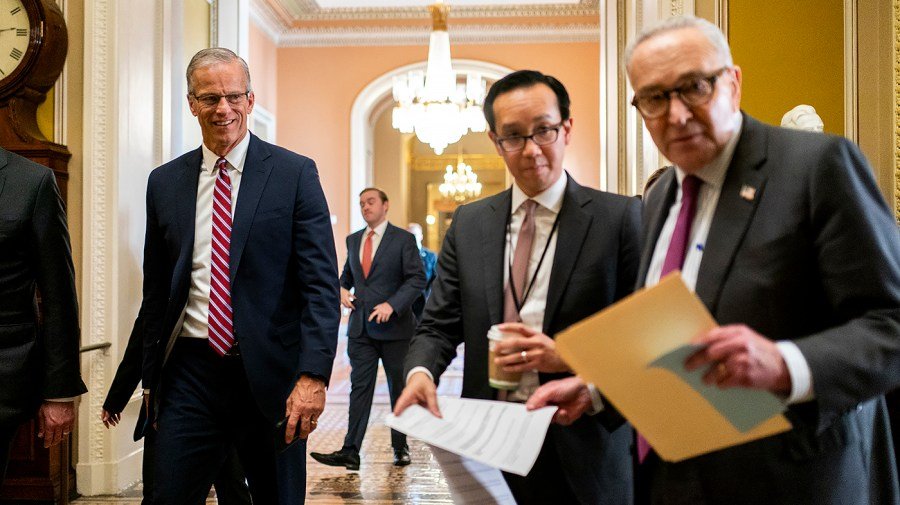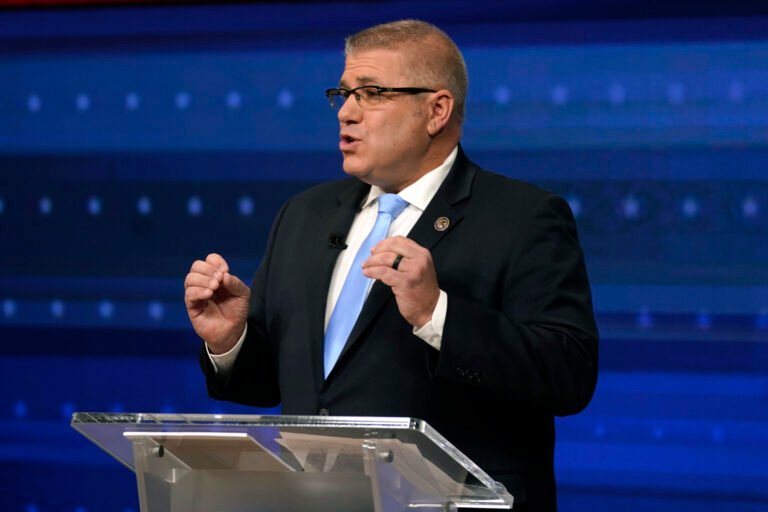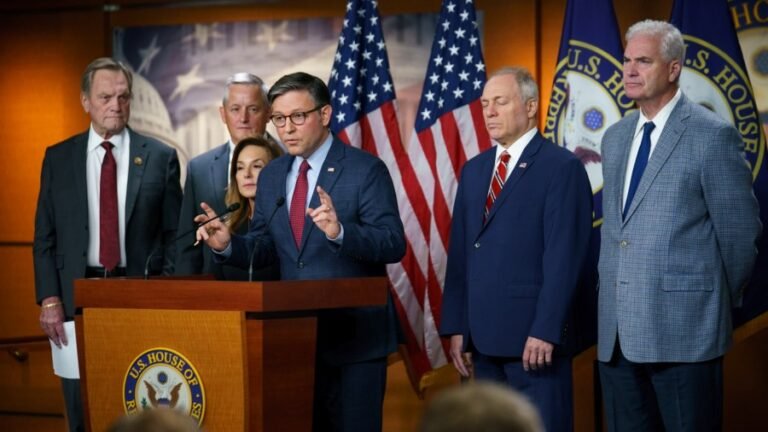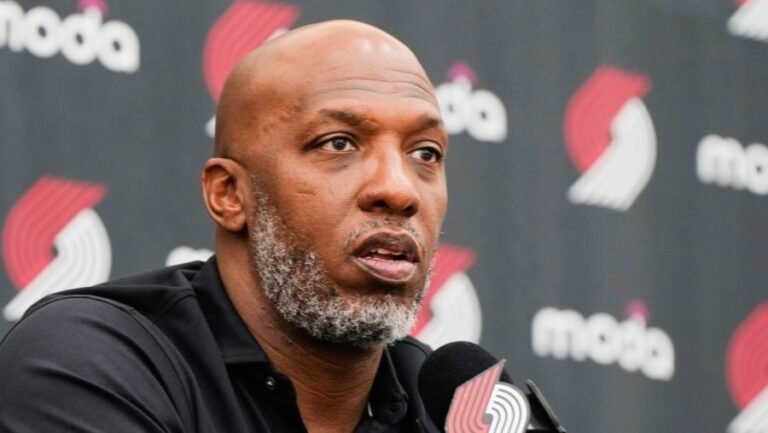
Republican senators hope that President Trump can step in and help end the 22-day government shutdown by beginning talks with Democrats on enhanced health insurance premiums, which would give Democrats confidence about having a path to an eventual deal.
Several Republican senators say it would be helpful if Trump were to become more involved in breaking the stalemate by talking with Democratic leaders, which could open a a face-saving path for Democrats to reopen the federal government.
Senate Majority Leader John Thune (R-S.D.) and Speaker Mike Johnson (R-La.), however, insist there’s nothing to negotiate with the Democrats while the government is shut down.
GOP leaders say the only way to reopen the government is for eight Senate Democrats to vote for the House-passed bill funding the government through Nov. 21, which has already failed 12 times on the Senate floor.
Some Republican senators are growing impatient with the “Groundhog Day” atmosphere of the Senate, as they take the same vote over and over again.
A group of Republicans want rising health insurance premiums addressed, something they worry could become a major issue in the next election if costs skyrocket in 2026. Sen. Josh Hawley (R-Mo.) says he thinks Trump could begin talking with Democrats now to set the stage for an eventual deal, even if it doesn’t happen before the government reopens.
“I think it should happen now. I’m telling the Democrats, they ought to take [the president] a proposal and say, ‘Here’s what we want,’” Hawley said.
“They ought to take him a proposal and make him an offer and say, ‘Here’s what we want.’ He’ll presumably say, ‘Well, I can’t do that but I can do this.’ It’s how negotiation works,” he said.
Trump on Tuesday again indicated that he’s willing to talk to Democratic leaders about reaching a deal to fund the government and address rising health insurance premiums, which will hit many red states especially hard.
“I would like to meet with both of them, but I said one little caveat, I will only meet if they let the country open,” Trump told reporters, referring to Senate Democratic Leader Chuck Schumer (N.Y.) and House Democratic Leader Hakeem Jeffries (N.Y.).
Trump made waves on Capitol Hill earlier this month when he said he’d be open to making the “right deal” with Democrats on the expiring Affordable Care Act subsidies.
That statement was viewed by lawmakers as a break from Thune and Johnson’s strict position of not negotiating with Democrats until they agree to reopen the government.
Since then, the Senate has been locked in a stalemate, repeatedly voting on a House-passed funding measure that has never attracted more than three Democratic votes.
Some Republicans, such as Sen. Dan Sullivan (Alaska), are working with Democratic colleagues quietly in hopes of finding a deal to reopen the government, but with little success so far.
Sullivan told The Hill on Wednesday that it could help if Trump were involved.
“I’ve been working it. I have a number of ideas that I’ve been bouncing off Republicans, Democrats. We’ve been doing our policy lunches focused on this. I want to get to a solution,” he said of talks to find a bipartisan path to extending subsidies and curbing the rise in health care premiums.
The Alaska senator cautioned that the subsidy program will need to be changed to address waste, fraud and abuse.
“There needs to be reforms to the program, no doubt about it,” he said, noting that any deal to extend the expiring Affordable Care Act subsidies will take weeks to put together.
Sullivan said Trump could make a positive difference by talking to Democrats.
“If the president gets involved on big, complicated issues, it’s always helpful,” he said.
Sen. Jim Justice (R-W.Va.) said he and other Republicans have tremendous confidence that Trump could find a way to end the shutdown.
“At the end of the day, we all have a lot of confidence in President Trump. He’s the leader of the band. And we’re to the point in time now where we have an 18-karat food fight going on. So at some point in time the leader of the band is going to step up and guide us,” he said.
He called the shutdown “terrible” and related a story of how he encountered a worker on Capitol Hill who was crying in the hallway because of the strain of not getting a paycheck for weeks.
“I got off my little scooter and said, ‘Can I give you a hug and at least say we’re trying,’” Justice, who uses a mobility scooter to get around the Capitol, recalled.
“We have to get off our you-know-what and get something done,” he said.
Justice said he thinks Republicans would go along with a deal to reopen the government and extend the Affordable Care Act subsidies if Democrats drop some of their other spending demands, which total close to $1.5 trillion.
“It would be good if we extended them,” he said of the subsidies. But he said the subsidies need to be phased out at some point in the future to limit the impact on the federal debt.
“If we could leave everything else aside and that was all the table, I really believe that you’d see a lot of people who could go along with that,” he said of extending the expiring enhanced subsidies.
Thune and Johnson have consistently taken the position that there’s nothing to negotiate with the Democrats, who need to “come to their senses” and vote for the House-passed funding bill — even though it’s failed a dozen times already in the Senate.
Thune says he’s willing to have a conversation on the expiring insurance subsidies only once the government is open.
Senate GOP leaders have scheduled a vote on legislation Thursday to pay essential federal workers during the shutdown, his latest attempt to put more pressure on the Democrats.
Speaking at the White House on Tuesday, Thune told reporters “I don’t know what there is to negotiate.”
He said he had already offered Democrats “several off-ramps,” such as a future Senate vote on legislation to extend the Affordable Care Act subsidies and to bring the regular appropriations bills to the Senate floor for votes.
“People keep saying ‘negotiate.’ Negotiate what? I don’t know what that is right now,” Thune said.
Asked if Trump needs to get more involved in the negotiations, Thune said: “At some point, but open up the government first.”
Senate Appropriations Committee Chair Susan Collins (R-Maine) sided with her leadership, saying Wednesday she doesn’t think Trump’s intervention is necessary to solve the crisis.
“I think we should be able to solve this ourselves, I really do,” she said when asked about the expiration of the enhanced insurance subsidies.


